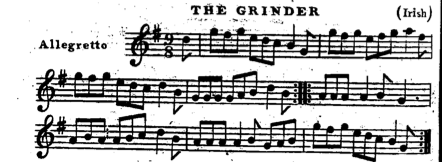
I was tempted to put the ballet-class equivalent of the Holy Family on the 25th of this advent calendar, to finish off the series with a heart-warming sentimental twist that starts “… in spite of all these things that make me anxious, I love playing for ballet, and these little things are what makes it exciting and interesting.” But just in time to save you from such a sugary end, I remembered the 9/8. This list of anxieties wouldn’t have been complete without it.
Now I’m not talking about the kind of 9/8 that’s just a 3/4 in disguise, that is, a tune that’s in three with a lot of “diddly diddly diddly” underneath it (see earlier post). I mean a proper 9/8 where the tune itself goes diddly diddly diddly diddly diddly diddly, without stopping for breath. I mean those 9/8s that are weird in the same way that the polonaise is weird, where phrases finish on the weakest possible (final) beat; where the end of the phrase feels like you’ve leapt on to the tube as the doors were closing, and just managed to pull your coat free as you got inside. Look at the example above – what kind of music ends on a little note like that? That’s like finishing a sentence with a comma,
I never trust myself to improvise them, because I have so often got hopelessly lost in the middle of them in class. It goes so well for so long, but it only needs one beat to go wrong to mess the whole class up, and once you’ve slipped up in a slip jig (another name for the 9/8), it’s hard to pick yourself up again. I’ve got a few in my head that I keep for special occasions, and stick to what I know.
It’s a strange pocket of ballet behaviour, the 9/8. It’s relatively rare in music*, but it seems someone once thought that it would be a good thing if ballet teachers learned about it, like you’d learn about the two-toed sloth, or photosynthesis. So the 9/8 crops up occasionally in class like a trick question, just when you least want or expect it. I rather like them, but they make me nervous.
Happy Christmas.
*Justin London wrote a paper called “The Binary Bias of Metric Subdivision and the Relative Complexity of Various Meters, or, Why is 9/8 so Rare?” given at the 4th International Conference on Music Perception and Cognition, Montreal, Quebec, August 1996. The background to the theory is also explained in his book Hearing in Time (second edition) on pp. 44-45.

